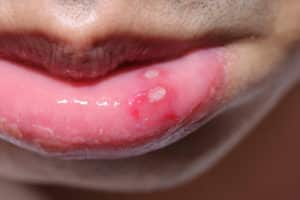Soothing Mouth Sores and Oral Issues


Mouth sores such as cankers, cold sores and infections are some of the most common oral health problems patients get after cavities and gum disease. These issues can be quite uncomfortable for patients, especially if they happen often. Changes in oral health care habits can help reduce the mouth sores and oral issues you get. However, when they happen, you can use these tips to help soothe and relieve those mouth sores quicker!
Common Mouth Sores
Have you ever had pain in your cheeks or gums and discovered a sore? This is nothing to panic about, but something that happens quite often with patients. The most prevalent ones we see include:
- Dental caries
- Gum disease
- Canker sores
- Gingivitis
- Thrush
- Hand, foot and mouth disease
- Herpangina
- Oral herpes/cold sores
Some of these conditions are genetic, whereas others can be caught very early. With any mouth sore, you want to get them under control or work hard to prevent them in the first place. Many mouth sores and infections can actually be avoided with good oral hygiene and keeping mouth bacteria to a minimum. Dental caries (tooth decay), gum disease, oral bacteria and more never have to happen if you brush and floss away the gunk that likes to stick around in your mouth.

Relief of Canker Sores
One of the most common mouth sores is the canker sore. This is a type of sore that can be very tiny or very large. Some patients will have these sores be 1/3rd to ½ of an inch in diameter in the mouth. Others will get tons of tiny canker sores. You may be a patient that only gets canker sores in times of stress or sickness. The cause of these stores is still being studied, as every person’s body will get these mouth sores for different reasons. The thing most patients have in common is that canker sores can be uncomfortable and even painful (hence the reason it’s called a sore).
Some evidence suggests that infections or illness can cause canker sores to happen. However, there have been many studies done that link canker sores to stress levels. Studies show that stress can contribute to developing sores in your mouth. Those sores are actually considered to be tiny ulcers in the mouth, and you can reduce their frequency with good de-stressing activities.
Remedy Mouth Sores At Home
When it comes to sores in your mouth, salt will become your best friend. For centuries, people have used salt to help wounds heal faster and better, and that includes sores in the mouth. If you’ve ever had oral surgery (like wisdom teeth removal) before, a sickness or infection in the mouth, your dentist may have told you to rinse with salt water. Studies show that salt is a natural mineral that helps speed healing in the soft tissues of the body.
Salt can take away the sting of mouth sores and make them go away faster. Simply fill a cup with warm to hot water and dissolve an ample amount of salt into the water. Water will have to be hotter to melt the salt, but you can let it cool a bit before swishing with it. Then, several times a day, swish the salt-water mixture in your mouth (making sure it is warm). Within a day, you should see less pain and your mouth sores getting better.

Professional In-Office Help
There are some mouth sores that you just don’t want to handle on your own at home. With chronic oral health diseases such as tooth decay and gum disease, you want a dentist to monitor sores closely. Any sores that bleed or continue to grow in size are ones you want a dentist to look at. You may want both medical or dental counseling for canker sores that grow to be ½ inch or larger, especially if you have many of them. Having multiple mouth sores cold be a sign of infection, illness or an oral health disease.
Oral cancer is a serious condition that can present itself in the form of mouth sores, especially if you feel tenderness and lumps in the soft tissues of your mouth but you can’t see them well. This cancer claims almost 50,000 lives every single year in the U.S. Luckily, with oral cancer, we do in-office screenings at every dental cleaning and comprehensive exam you have. This is a time when we can see mouth sores forming and provide the right topical and oral medications to help relieve them.
Cold sores are a type of sore that come from the herpes simplex virus. This is a recurring sore, but you can reduce how many you get with over-the-counter creams and medications. Stress, sunlight, the cold, trauma and oral health problems can cause these to flare up. With some sores (like canker sores), if the problem is recurring very frequently, it could be a sign of a chronic condition such as Crohn’s disease or celiac. In this case, we can refer you to the right medical professional for intervention. Mouth sores can be unpleasant, but almost all of them are very treatable when you seek dental help and change your habits at home.

Healthy Mouth through Healthy Habits
Issues such as tooth decay and gum disease are ones that should be handled by a dentist, as these conditions will continually worsen without dental intervention and good oral hygiene habits at home. That means brushing your teeth at least twice a day for two minutes at a time as recommended by the American Dental Association.
Floss 1-2 times a day as well, use mouthwash to reduce mouth bacteria and limit your sugar intake to prevent cavities and gum disease. All of these steps will help you from developing sores in your mouth. You can prevent many mouth sores through good oral hygiene. For all of your questions about your oral health and changes you see inside your mouth, call Dr. Ania’s office at 303-443-0998!


